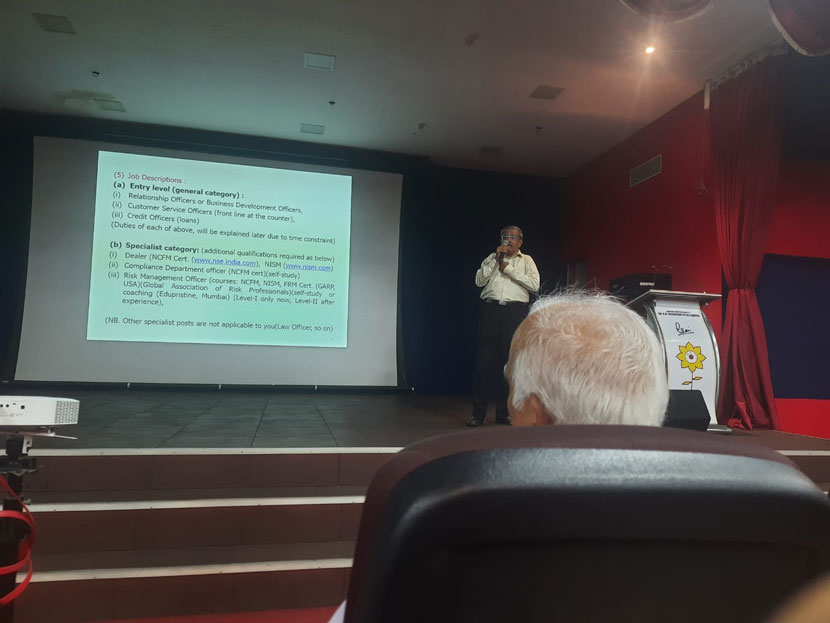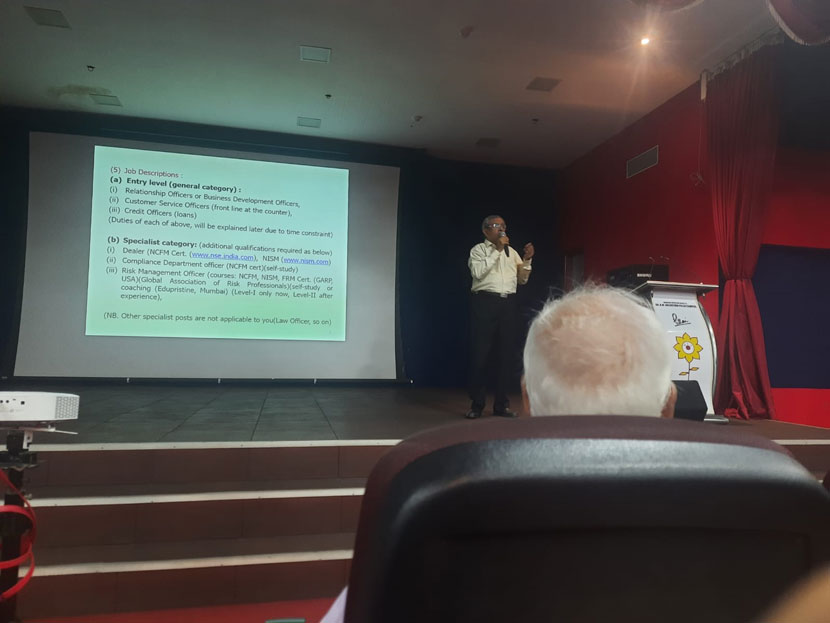Students are guided for the following banking exams:
Banking Personnel Selection (IBPS), State Bank of India (SBI Probationary Officers), Reserve Bank of Officers, NABARD Officers examinations. (Many students registered for the IBPS examination and prepared vigorously).
(a) Students are guided and motivated to acquire additional qualifications :
Second year MMS students were guided to remain ONE above the crowd and NOT ONE among the crowd and acquire additional qualifications as under:
Certificate courses offered by National Institute of Securities Market (NISM) (sponsored by Securities & Exchange Board of India (SEBI for educational initiative to create employability in Financial Markets).
Courses recommended to students: (Some students have passed and obtained certificates)
(1) Securities Market Operations (Bank’s Treasury Department),
(2) Debt Market Operations (Bank’s Treasury Department)
(3) Risk Manage Share Market Operations (Dealers in Treasury Department in Banks)
(4) Depository Operations (related to Share market),
(5) Treasury Operations (Commercial Banks, Co-operative Banks, Corporates, Mutual Funds, Investment Banks, Brokerage firms and other Funds),
(6) Risk Management (Banks, Mutual Funds, Investment Banks, Brokerage firms),
(7) Research Analyst (Banks, Mutual Funds, Investment Banks and Brokerage Firms, Foreign Exchange Dealers),
(8) Debt Market Operations (Banks, Mutual Funds, Broking Firms, Investment Banks, Mutual Funds).
(9) Risk Management Departments
(10) Investment Advisor (Portfolio Management Department)
(11) Research Analysts (Bank’s Treasury, Mutual Fund Treasury)
b) Certificate Course in Financial Markets (NCFM) offered by National Stock Exchanges (NSE and BSE):
(1) International Qualifications:
Students were informed to pursue FRM certificate courses which are recognized by all Banks globally for recruitment as Risk Managers in Banks. One student has passed (Level-1), some students are still pursuing.
(1) Financial Risk Manager’s (FRM) Certificate course of Global Association of Risk Managers (GARP, USA)
(2) Certified Financial Analyst (CFA) course, USA. Some students have enrolled and are studying for these courses.
(2) Books Recommended: The following materials are suggested by me for writing banks’ competitive examinations and available sources (Book shops) were also informed to them.
(i) English comprehension: 4 books and competitive examinations magazines recommended.
(ii) General Knowledge: 4 books and 2 monthly magazines (high quality namely Banking Services Chronicle)
(iii) Quantitative Aptitude: 1 Book (written by Dr Agarwal) (high quality and comprehensive book for all competitive bank exams) and monthly magazines for practice
(iv) Test of Reasoning (logical reasoning): Dr. Agarwals’ Book (published by S. Chand & Co, New Delhi) and also monthly Banking Services Chronicle magazine and Current Affairs magazine).
(3) Coaching and Counseling:
(i) Oral coaching in the class after teaching hours
(ii) Quiz programme (relating to current affairs, banking, economic, finance and general knowledge)
(iii) Discussion on the previous banking exam. Question papers,
(iv) Home Practice (practice test question papers)
(4) Confidence Building and Approach to examinations :
Resource person has more than 36 years’ of experience in the Banking sector and has served as a Faculty member in SBI Staff College. Bank’s Training Centre. With his wisdom, he helped the students to overcome the fear and also build confidence. He persuaded them to appear in competitive banking examinations conducted by IBPS. Many students have applied for IBPS exams.
(i) Taught how to tackle the banks competitive examination and how it is different from other academic examinations;
(ii) Approach to time management during examination;
(iii) How to avoid negative marks in competitive examinations;
(iv) How to score high marks from among FOUR sections of bank examination question papers (as there is no cut-off for each section namely, English, General Awareness, Test of Logical Reasoning, Quantitative Aptitude).
These approaches helped the students to a large extent in the competitive examinations.
(5) Personal Interviews :
He prepared the students to face interviews in Banks and other finance related jobs on the following lines:
(i) How to prepare for interviews and how to answer;
(ii) How to remain calm, composed and confident during interview so as to answer effectively;
(iii) Interview etiquettes (presentable appearance, manners, smiling, behavior, sitting postures, greeting the interview members, voice modulation, admittance to unknown answers, eye-contacts while answering, logical flow of answering the questions)
How to Prepare for an Aptitude Test During Campus Placements
A vast majority of companies conduct an online aptitude test to filter freshers. Generally, it is the very first round of an on-campus pool drive. The aptitude test round could be either an online one or a paper-based test.
Aptitude tests conducted during campus placements contain objective type questions. So, preparing for such an aptitude test is not actually as tough as it seems. If you practice in advance, you can crack it with ease. What are the sections of an aptitude test?
Questions in an aptitude test are based on concepts that test your cognitive capacity for work. In order to assess your skills, the following sections will be covered in your upcoming aptitude test:
(i) Numerical reasoning: Questions in this section are based on statistics, charts, graphs and figures.
(ii) Verbal reasoning: Questions in this section test your ability to comprehend and reason complex concepts expressed in simple English.
(iii) Diagrammatic tests: In these questions, you will be asked to analyze a sequence of inductive shapes, abstract patterns and sometimes numbers.
(iv) Situational judgment tests: These questions test basically assess how you approach situations which you may encounter in a workplace.
(v) Inductive reasoning: These questions are based on derivations of general principles from certain observations.
(vi) Cognitive ability: It is basically the use of mental activities and skills to do reasoning, understand situations, remember a sequence of activities and pay enough attention to solve the puzzle.
(vii) Mechanical reasoning tests: These puzzles are part of the test technical and engineering positions.
(viii) In-tray exercises: Questions in this section are business-related scenarios which can assess how to prioritize tasks
How to crack an aptitude test ?
(1) What to do for an online aptitude test?
(i) Practice ample online aptitude tests: Generally, aptitude tests are conducted online. In order to do well, practice online tests and solve mock question papers within a stipulated time. This is a way of practicing that will help you crack the actual test.
(ii) Carry the right stationary: Buy a good calculator, in case you are allowed to carry one. Most companies will not let you carry calculators as they would want you to solve the questions yourself. In such cases, carry lots of rough sheets. Also, have blue / black pens handy along with some pencils, erasers, sharpeners and a watch. Practice all the essentials so that your assessment goes well.
## Practice as many mock aptitude tests as you can: Before sitting for the placement interview on campus, you should prepare well. Practice lots of questions to build up your confidence.
(iii) Search the internet for more and more information: This will help you gauge the type of test you are about to face. Ask as many questions to your seniors and placement officer as possible. Only then will your aptitude test go well. Also, remember that you will appear the same online in most of the cases.
(iv) Practice in a comfortable environment: Your aptitude test is your door to the employment world. So, take it seriously. When you are practicing or studying your concepts, be seated in a peaceful place. Give every single formula and question your complete attention.
(v) Make sure that you practice tests set up by the target company: If you want to sit for an aptitude test conducted by Amazon, ensure that you practice placement papers from the past 3 years at least. Focus on the aptitude section and try the worked-out examples to understand better.
(vi) Get as much as guidance before appearing for the assessment: Keep track of time, divide your attention span accordingly, and then spend time on each question.
(vii) Try to familiarize yourself with all kinds of figures: Questions with graphs, tables and pie charts are a little difficult. Since they are not easy to comprehend, practice such questions and solve them in the test carefully.
(viii) Work on rough sheets and paper: While most aptitude questions are conducted online, a majority are still conducted on paper. Whatever may be the case, make it a habit to calculate on paper. Your calculations should be legible on an A4 sheet as some companies check your rough sheet as well.
(ix) Request feedback: You should be notified about your result. Your result will help you understand where you went wrong or how many of your solutions were incorrect. Get in touch with the company’s HR via email in case the result is delayed.
(x) Carry a calculator: If you are allowed to carry one, use a good quality engineering calculator. You might not be allowed to use your phone. Hence, ensure you are familiar with the calculator.
(2) What to avoid during an aptitude test?
(i) Don’t make a friend write the aptitude test for you: If you are supposed to attend a campus interview drive, do not make a friend sit for you. In case you get caught, you will get blacklisted by companies! Avoid cheating the system and stay clear of malpractices during the test. These tests are for your assessment and even if you flunk them, you will benefit from them. Ensure you are comfortable about your skills; only then you will be able to deliver up to the required standards.
(ii) Don’t get bogged down by one question: In case you get stuck with one question, move on. Getting stuck on one question for too long may cost you your complete test! Solve the remaining questions and return to the left-out questions in the end. These tests also assess your time management skills. So, play smart.
(iii) Don’t make wild guesses: Your aptitude test will have a score which may combine speed with accuracy. It’s important that you do not guess haphazardly or hurriedly try to finish all the questions. Try to work as carefully as possibly at a decent speed. Allocate a fixed time to every question.
(iv) Don’t procrastinate: Move on. If you think a question is going to take a really long time, flag it. If possible, come back to it later. Some questions can be really time consuming and you may be better off coming back to it after you are done with all the easy ones.
(v) Don’t discuss too much after the test: Refrain from discussing your test result with friends. Be confident about what you did. If you really want to check your results, wait for the evaluator or assessor to announce.
Aptitude tests are basically categorized as per the type of work-related cognitive ability they assess:
Companies assess the following skills in you, from your fluid intelligence test:
(i) Effective problem-solving skills
(ii) Capability to quickly learn new skills
(iii) Ability to quickly integrate new information
(iv) Capacity to strategize
(v) Ability to deal with ambiguity
(vi) Decision making skills
Aptitude tests in this group include:
(i) Abstract problems
(ii) Conceptual aptitude problems
(iii) Diagrammatic reasoning
(iv) Inductive problems
(v) Logical reasoning questions
What to expect:
(i) All the non-verbal questions need to be completed within a predefined time
(ii) Every question should be solved in under 30 seconds
(iii) Level of difficulty of these questions is such that only 1-5% of the population can solve the same correctly
(iv) Every question has a scenario with multiple choice answers
(v) To solve test questions, one has to identify logical rules
(v) These rules need to be applies to figure out the subsequent or ‘odd-one-out’ shape
Crystallized Intelligence
It is your ability to learn from past experiences. You need to apply this learning to work-related situations. Work situations that require crystallized intelligence include producing and analyzing written reports, comprehending work instructions, using numbers as a tool to make effective decisions, etc.
Aptitude tests in this group include:
(i) Verbal aptitude tests
(ii) Numerical aptitude tests
(iii) Spatial aptitude tests
(iv) Mechanical reasoning tests
What to expect in this type of aptitude test:
(i) A set of verbal or numerical problems which must be completed in a predefined time.
(ii) The time limit is defined in such a way that only 1-5% of the population can correctly solve all the test questions within the time frame provided.
(iii) Each test question has only one correct answer.
(iv) Test questions offer you written information such as statements, tables or graphs. Your task is to quickly analyze the given data and make correct business decisions.
Last minute tips to prepare for a campus placement interview or aptitude test
(i) You must brush up your concepts: The night before your aptitude test is crucial. Prepare well and revise all your concepts thoroughly. The benefits of career assessment tests like an aptitude round are innumerable. Your score in this round will help you judge your own IQ level as well as evaluate your preparation for a professional job.
(ii) Review thoroughly: Practice all the important formulae related to number systems, HCF and LCM, time and work, averages, percentages, profit and loss, time and distance. These topics are crucial for upcoming aptitude exams. So, do not neglect them.
(iii) Sleep well: Take ample rest before the test. Do not overthink or overdothe revision. Limit your revision time to about 2-3 hours, have a healthy meal an hour before bedtime at least. This will help you sleep well. Avoid indulging into binge-watching or net surfing.
Hope the above pointers will come in handy during the preparation for an online aptitude test.
Syllabus for the Bank Examinations
(A) GENERAL CATEGORY OFFICERS:
(1) Quantitative Aptitude
- Data Interpretation
- Boats and Streams
- Time and Work
- Time, Speed and Distance
- Partnership
- Mixtures and Alligation
- Ages and Average
- Profit and Loss
- Percentage and Interest
- Problems on Trains
- Pipes and Cisterns
- Area and Volume
- Number Series
- Linear equations
- Quadratic equations
- Data sufficiency
(2) Reasoning
- Puzzles
- Seating Arrangement
- Machine Input Output
- Order and Ranking
- Inequalities
- Problems based on ages
- Statement and Assumptions
- Statement and Conclusion
- Coding-Decoding
- Statement and Argument
- Venn Diagram / Syllogism
- Blood Relation
- Direction and Distance
(3) English
- Reading Comprehension
- Cloze Test
- Error Spotting
- Double Fillers
- Sentence Rearrangement
- Vocabulary Based Questions
(4) General Awareness
General Knowledge relating to economy, banks, industry, business, financial markets, financial institutions, financial instruments, financial services, financial regulators.
Fluid Intelligence
These problems are based on your ability to think and reason in an abstract way to solve problems effectively and think deliberately. These are ‘street smart’ problems also known as the technique to ‘quickly think on your feet’.
A Report on Competitive Exam 2021
Name of Activity: Guidance for competitive examination.
Students are guided for the following banking exams:
Banking Personnel Selection (IBPS), State Bank of India (SBI Probationary Officers), Reserve Bank of Officers, NABARD Officers examinations. (Many students registered for the IBPS examination and prepared vigorously).
Students are guided and motivated to acquire additional qualifications :
Second year MMS students were guided to remain ONE above the crowd and NOT ONE among the crowd and acquire additional qualifications as under:
- Certificate courses offered by National Institute of Securities Market (NISM) (sponsored by Securities & Exchange Board of India (SEBI for educational initiative to create employability in Financial Markets).
Guidance for Competitive exam schedule:
| Days | 2021-2022 |
|---|---|
| Thursday | 16th September, 2021 |
| Friday | 17th September, 2021 |
| Saturday | 18th September, 2021 |
| Thursday | 23rd September, 2021 |
| Friday | 24th September, 2021 |
| Saturday | 25th September, 2021 |
| Thursday | 30th September, 2021 |
| Thursday | 7th October, 2021 |
| Friday | 8th October, 2021 |
| Saturday | 9th October, 2021 |







